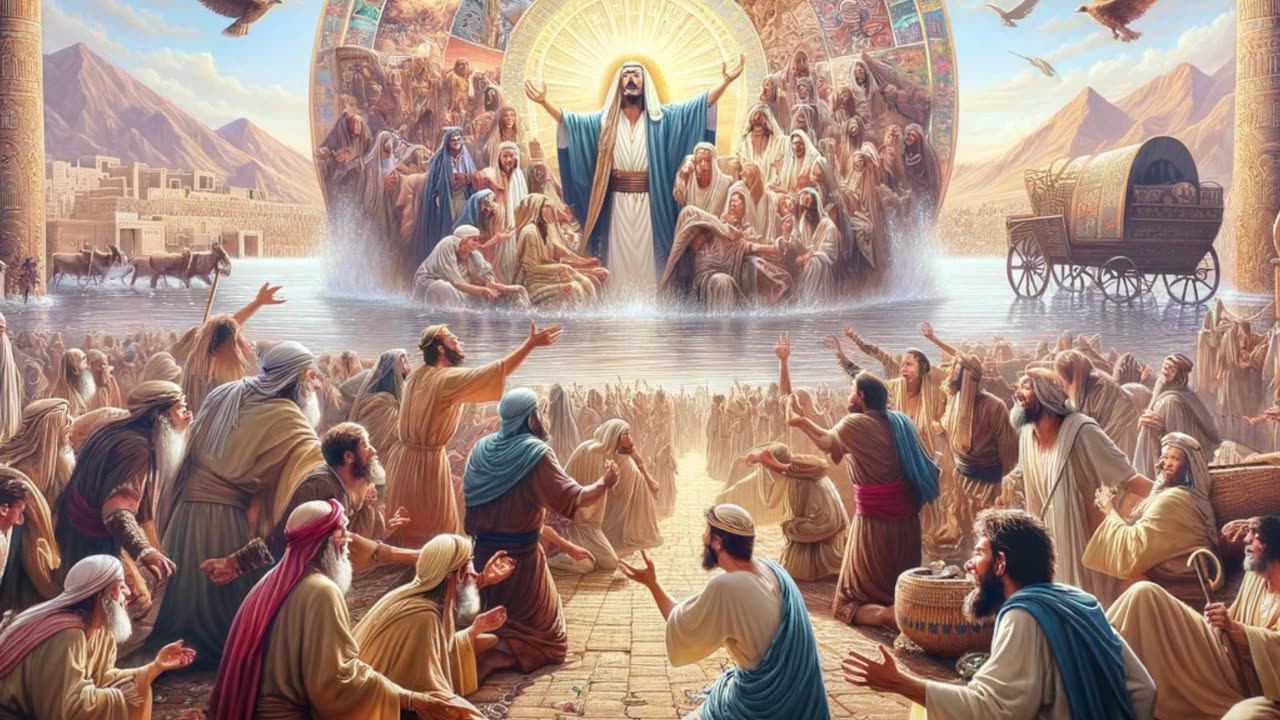Premium Only Content

Genesis 45 Divine Recognition and Forgiveness:
Food for Thought Description
In the poignant narrative of Genesis 45, Yosef reveals himself to his brothers who had sold him into slavery, a moment of profound recognition and forgiveness. This scene echoes in the New Testament when Yahusha, not initially recognized as the Messiah, was finally understood by His disciples in the breaking of bread after His resurrection (Luke 24:30-31). Similarly, Yosef's forgiveness of his brothers prefigures Yahusha’s teachings on the necessity of limitless forgiveness, as He instructs Kepha (Peter) to forgive "seventy times seven times" (Matthew 18:21-22), emphasizing the boundless nature of divine forgiveness.
Preservation and Providence Through Trials:
The biblical theme of preserving a remnant through adversity is vividly portrayed in the stories of Noach and the great flood and the later exiles of Israel and Yahudah. Despite judgment, a remnant is always preserved, which Yeshayahu (Isaiah) 10:20-22 highlights as a return to the mighty Alahim. This theme is also encapsulated in Yosef’s life, where seven years of plenty followed by seven years of famine demonstrate Yahuah’s providential care. Yosef’s divinely inspired strategy not only anticipates the hardships but also ensures Mitsrayim's (Egypt's) survival, symbolizing both preparation and providence.
The Symbolic Completeness of the Number 7:
Central to Yosef's story and Biblical creation, the number 7 symbolizes completeness and divine orchestration. In Bereshith (Genesis) 1, Yahuah's creation of the world in six days, culminating in a seventh day of rest, establishes a pattern of completion and sanctity that resonates through scriptural narratives. The seven-year cycle in Yosef’s era underlines that survival and reunion sometimes require enduring a complete cycle of hardship, as seen when Ya'akov (Jacob) moves to Mitsrayim to be with Yosef, ensuring his family's survival through the remaining five years of famine.
Insightful Reflection:
The decision of Ya'akov to move his family to Mitsrayim, driven by the continuation of the famine, underscores the theme that Yahuah’s plans often require enduring through a complete cycle of challenges for fulfillment. Had the famine been shorter, Ya'akov might have remained in Kena'an (Canaan), altering the course of biblical history and the essential lessons we draw from these narratives.
-
 LIVE
LIVE
SpartakusLIVE
4 hours agoARC is SO ADDICTING - I just CAN'T stop || NEW SCHEDULE, NEED SLEEP
877 watching -
 LIVE
LIVE
Drew Hernandez
19 hours agoEPSTEIN TRANSPARENCY ACT PASSES: POLITICAL THEATER OR FULL DISCLOSURE?
793 watching -
 LIVE
LIVE
StevieTLIVE
3 hours ago#1 SOLO Warzone POV 6.9 KD
39 watching -
 2:57:53
2:57:53
Barry Cunningham
6 hours agoBREAKING NEWS: PRESIDENT TRUMP HOSTS DINNER WITH SAUDI ARABIA CROWN PRINCE MOHAMMED BIN SOLMAN !
50.4K24 -
 LIVE
LIVE
Spartan
2 hours agoPro Halo Player, insta locking Neon, plays Valorant for the first time since Beta. Rusty af on MnK
166 watching -
 30:14
30:14
Robbi On The Record
11 days ago $7.22 earnedYou’re Out of Alignment: Spiritually, Mentally, Physically. Here’s Why. ft Dr. Rich
49.2K4 -
 57:56
57:56
Sarah Westall
2 hours agoFormer DIA Chief of Global Operations: CIA and FBI - Broad Institutional Crisis w/ Jeffrey Prather
15.2K -
 LIVE
LIVE
Joker Effect
1 hour agoGIRTHY GORILLA AND SOUNDBOARDLORD Chime in as to WHY THEY DID IT! What do they need!
365 watching -
 2:07:43
2:07:43
Blabs Life
11 hours agoLow IQ Apex Legends | Noob Plays
27K1 -
 13:09:14
13:09:14
LFA TV
1 day agoLIVE & BREAKING NEWS! | TUESDAY 11/18/25
254K34